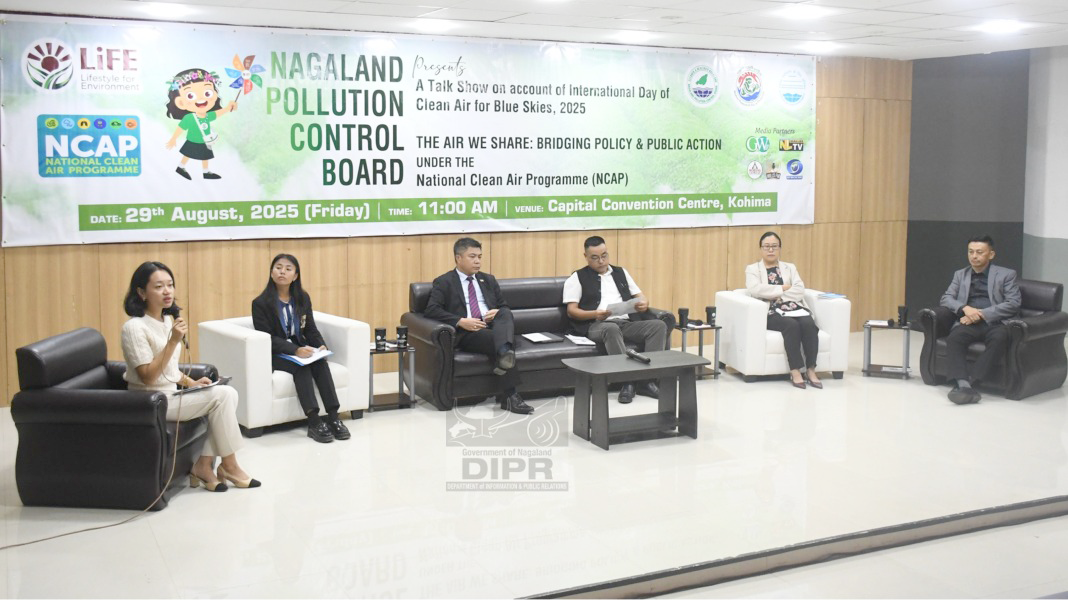Senior Environmental Engineer of the Nagaland Pollution Control Board (NPCB), Er. Aghali A Swu, has stressed that access to clean air is a basic human right and a cornerstone of a healthy, sustainable environment.
Delivering the keynote address during a Talk Show on the occasion of the International Day of Clean Air for Blue Skies 2025, Swu described the global observance as a vital reminder of the collective responsibility to ensure clean air, which is a basic human right and an essential component of a healthy and sustainable environment.
She recalled that the day, established by the United Nations General Assembly in 2019, is aimed at recognizing the critical importance of clean air for the health and daily lives of all people, while also serving as a platform to raise awareness, encourage action, and promote international cooperation to combat air pollution.
Highlighting this year’s theme, “Racing for Air”, Swu said it is a clarion call for urgency, stressing that clean air is not a luxury but a necessity. Every stakeholder—governments, corporations, civil society, and individuals—must be part of the solution, she said.
Calling air pollution one of the most pressing environmental health risks of the present time and the world’s largest environmental killer, Swu pointed out that its impacts extend beyond human health and contribute significantly to climate change by raising concentrations of greenhouse gases that harms ecosystem, damaging forests, crops, and water bodies. She further noted that air pollution undermines economic productivity, increases health-care costs, and reduces workforce efficiency.
She informed that under the National Air Monitoring Program, the NPCB has set up four manual air monitoring stations and one Continuous Ambient Air Quality Monitoring Station in Kohima.
According to data collected since 2010, Kohima has failed to meet the national ambient air quality standards of 60 micrograms per cubic meter, Swu said. Both Dimapur and Kohima were categorized as Non-Attainment Cities by the Central Pollution Control Board after failing to meet prescribed standards for five consecutive years between 2011 and 2015.
Swu mentioned that the National Clean Air Program (NCAP), launched by the Ministry of Environment, Forest and Climate Change in 2019, has engaged multiple stakeholders to prepare and implement city-specific action plans for mitigating air pollution for Dimapur and Kohima cities by implementing various action plans to mitigate the air pollution.
Download Nagaland Tribune app on Google Play

She, therefore, emphasized that achieving clean air is not solely the responsibility of the stakeholders but a shared responsibility that rests on each one of us that can be attained only through collective action by taking the responsibility of protecting our environment and committed to building a future where blue skies, clean air and healthy lives.
During the Panel Discussion on the theme “The Air We Share: Bridging Policy & Public Action” the panelists for the Talk Show were B Henok Buchem, NCS, Deputy Commissioner Kohima, Krodi Rhetso, NPS, Superintendent of Police Kohima, Hukato K Chishi, IFS, Member Secretary, Nagaland Pollution Control Board, Dr Kezholenu Sakhrie, MD (Respiratory Medicine) and Aningle, BA 3rd Semester student from Oriental College Kohima and the discussion was moderated by Rongsenben Longkumer, Junior Scientific Assistant, NPCB.
A recurring theme was a call from several panelists for collaboration between various stakeholders, Civil Societies and the general public to bring about tangible changes and achieve a meaningful progress.
The Talk Show was hosted by Nagaland Pollution Control Board was held at Capital Convention Centre, Kohima.

